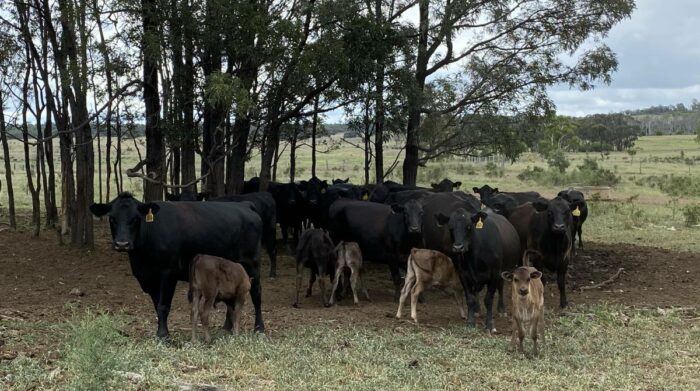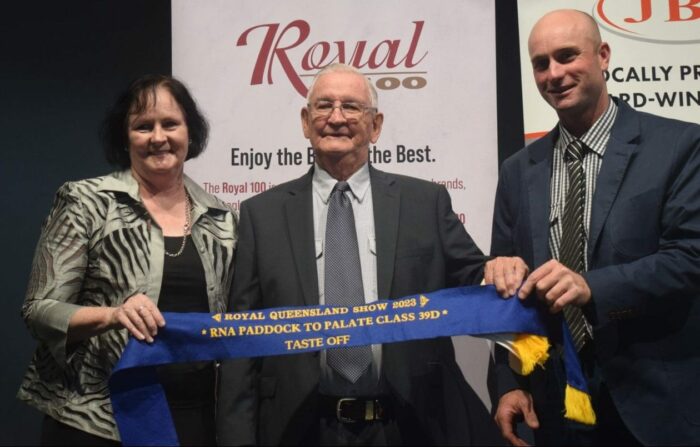Australian Wagyu Association Celebrates the Success of the 2023 RNA Paddock to Palate Competition and Wagyu Challenge.
The Australian Wagyu Association is pleased to celebrate the resounding success of the 26th anniversary of the RNA Paddock to Palate Competition, presented in partnership with JBS Australia. This prestigious event has once again demonstrated its role as a pivotal platform for Wagyu producers to showcase the exceptional commercial performance and value of their cattle, setting new standards for excellence and innovation in the red meat industry.
With almost $55,000 in prize money and an unparalleled opportunity for cattle producers to benchmark the quality of their livestock, the RNA Paddock to Palate Competition continues to uphold its status as one of the most significant beef supply chain competitions in Australia.
Dr Matt McDonagh, CEO of the Australian Wagyu Association said “the AWA sponsors the RNA Paddock to Palate Competition because it is the only truly head-to-head benchmarking carcase competition designed for Wagyu cattle. All animals are fed together in the same pen, processed at the same facility on the same day, meaning that the results can be compared reliably to each other, and that the competition is a true test of performance under the same conditions.
This year’s competition featured a comprehensive four-tiered approach, including the best aggregate weight gain, carcass quality, and MSA eating quality assessment. The esteemed Wagyu Challenge is then finished with a beef taste-off, judged by some of Queensland’s top chefs and Wagyu aficionados.
Overview of Competition Phases:
Overall Champion: Combined point score over all four phases.
Class 39 A: Individual Weight Gain (20%) – This feedlot competition evaluated the aggregate weight gain of a pen of 6 steers. Contestants were awarded one point for every 13 kg of weight gain. It contributed 20% to the overall score.
Class 39 B: Pen of Six Carcase Competition (40%) – This phase assessed carcass quality and constituted 40% of the total score, with points determined by carcase marbling, weight and meat yield.
Class 39 C: Carcase Value Competition (20%) – This phase involved the multiplication of HSCW (Hot Standard Carcase Weight) by MIJ camera marble score (0-9 grid $/kg, price determined in 2023). It contributed 20% to the total score.
Class 39 D: Beef Taste Off Competition (20%) – The highlight of the competition, this phase had each sample scored with 100 points. The judging process focused on appearance, juiciness, tenderness, flavor, and overall liking. This phase also contributed 20% to the total score.
Outstanding Achievements in each Class
Class 39 A: Individual Weight Gain
Hewitt Pastoral Enterprises were awarded first place in Class 39A for the highest individual weight gain. Their Wagyu/Angus F1 cross steers exhibited exceptional performance, achieving an impressive average daily gain (ADG) of 1.294 kg. This victory attests to their dedication to identifying high performance crossbreeding sires for F1 Wagyu production.
The culmination of this competition saw the remaining awards bestowed upon deserving winners during the Paddock to Palate Awards and Beef Industry Dinner 2023, held on Thursday, August 10th, at the Ekka.

Angus cows with F1 calves at foot. Image from Queensland Country Life, supplied by Cameron Hewitt.
Class 39 B: Pen of Six Carcase Competition
Achieving an exceptional triumph, Hamblin Pty Ltd of Strathdale, Sarina QLD, and Alan Hoey of Allora, Darling Downs, QLD, claimed a shared victory in the highly competitive Class 39B Pen of Six Carcass Competition. With an impressive score of 548.5 points each, these esteemed producers showcased their excellence in Wagyu production. Hamblin Pty Ltd and Alan Hoey have solidified their positions as frontrunners in the Wagyu industry consistently as they have been previously acknowledged in the Paddock to Palate competition – further cementing their reputation as producers of top-tier Wagyu beef.
1st: Hamblin Pty Ltd & Alan Hoey
3rd : Sunland Cattle Co P/L
39 B: Champion Individual Carcase: Poll Wagyu Pty Ltd
39 B: Reverse Champion Individual Carcase: Bar H Grazing
Class 39 C: Carcase Value Competition
Securing a well-deserved victory, Hewitt Pastoral Enterprises emerged as the triumphant leaders in the Class 39C Carcase Value Competition. Their exceptional pen of six animals garnered an impressive total of 95 points, proving their commitment to excellence in Wagyu production.
1st : Hewitt Pastoral Enterprises
2nd : Hamblin Pty Ltd
3rd : Sunland Cattle Co P/L
Class 39C: Highest Scoring Individual Carcase: Taldra Cattle Co, valued at $8,282.75
Class 39 D: Beef Taste Off Competition
Sunland Cattle Co stole first place in Class 39D Beef Taste Off Competition and demonstrated their unrivalled expertise in delivering exceptional beef quality. Their remarkable achievement was highlighted by an average carcase value of $6973, a testament to their commitment to producing top-tier meat. What truly set them apart was their mastery in the sensory taste test segment of the evaluation, securing outstanding scores of 92 and 91.5 out of 100. This extraordinary accomplishment underscores their dedication to not only superior meat production but also to providing a truly remarkable culinary experience.
1st : Sunland Cattle Co P/L
2nd : Hamblin Pty Ltd
3rd : Sunland Cattle Co P/L

Paul Harris and daughter Jennifer accepting their award for winning the 2023 Brisbane Show Wagyu Challenge, with Ryan Brown, group livestock manager with host feeders Smithfield Cattle Co. Image from Beef Central
Overall Winners:
Sunland Cattle Co claimed the title of Overall Champion in the Wagyu Paddock to Palate Competition. Renowned for their unwavering commitment to producing the highest quality Wagyu, Sunland solidified their reputation as leaders in the Wagyu sector.
According to Mr. Harris, who led the Sunland team to victory, the key to their triumphant Wagyu breeding lies in their consistent performance, particularly in marbling. “It’s no good producing a pen of show class winners, if the rest of the cattle at home aren’t as good for marbling and other traits,” he said. Sunland’s strategic approach is reflected in the remarkable outcomes achieved.
In this year’s competition, Sunland’s standout pen of six steers achieved an average camera-measured marbling score of 10.9. Notably, this exceptional performance included an extraordinary outlier with a marbling score of 15. This achievement was attained after a meticulous 400-day feeding period at JBS Beef City feedlot. Impressively, two-thirds of the pen achieved the competition’s maximum marbling score of 60. Sunland’s success in this realm truly highlights their commitment to superior marbling quality.
1st : Sunland Cattle Co P/L
2nd : Hamlin Pty Ltd
3rd : Sunland Cattle Co P/L
All winners and place getters exceptional achievements underscore the commitment to excellence and dedication that define the Australian Wagyu Sector, producing the World’s Luxury Beef.
The Australian Wagyu Association commends all participants for their dedication to advancing the standards of the Australian beef and Wagyu industry. We extend our heartfelt congratulations to the winners and express our gratitude to JBS Australia and the RNA for their invaluable support in making this event a resounding success.
